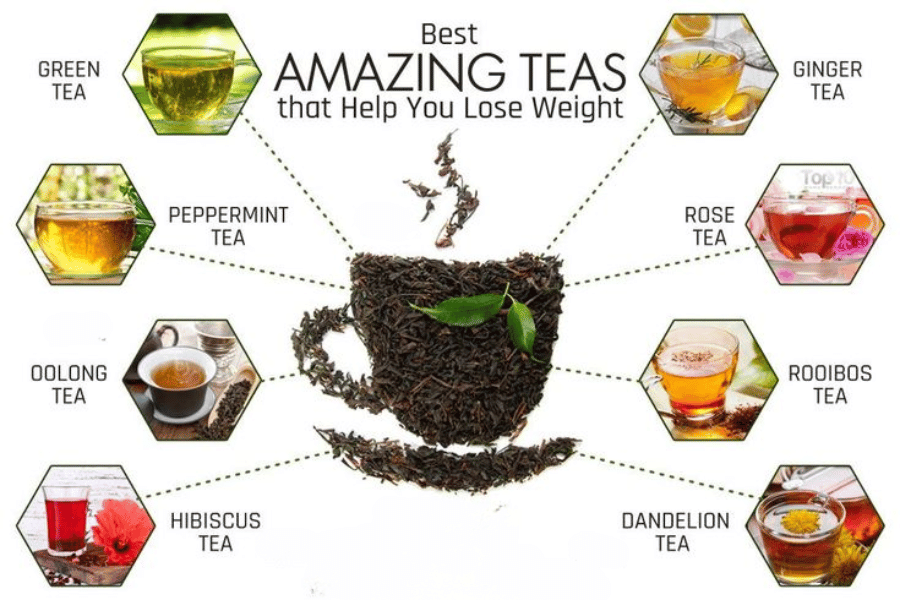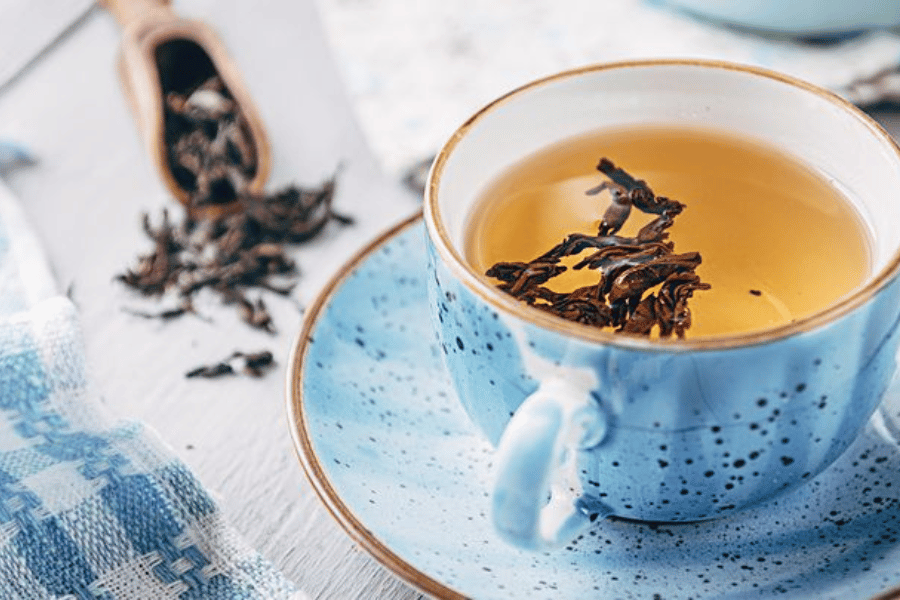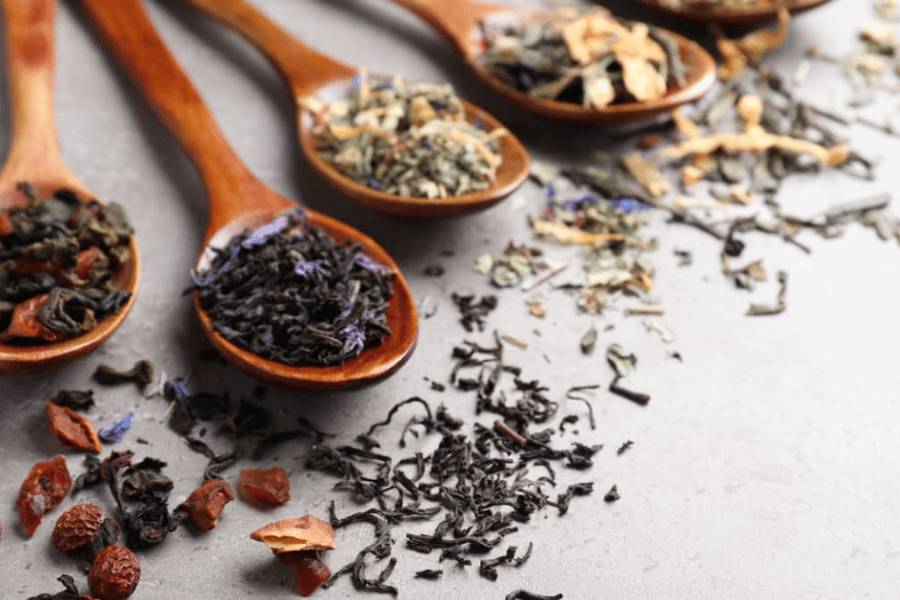Winter is not just a season of festivities and celebrations; it’s also a time when we seek comfort in warm, soothing beverages. Among these, tea stands out as a remarkable choice, especially for those looking to manage their weight. In this article, we’ll explore the types of tea for weight loss, emphasizing the need to select the right varieties during the chilly winter months. Tea isn’t just a beverage; it’s a lifestyle choice that harmoniously blends with the goal of weight management.

Green Tea for Weight Loss
Green tea, a staple in health and wellness circles, is especially potent when it comes to weight loss. Its effectiveness is attributed to the high concentration of catechins, a type of antioxidant. Epigallocatechin gallate (EGCG), the most prominent catechin in green tea, has been extensively studied for its ability to boost metabolism and enhance fat burning.
Varieties of Green Tea
Each variety of green tea offers a unique taste and set of health benefits:
- Matcha: A Japanese favorite, Matcha is a powdered green tea rich in nutrients and antioxidants. It’s known for its ability to increase energy expenditure and fat oxidation.
- Sencha: This popular Japanese green tea has a delicate balance of sweetness and bitterness, offering a moderate amount of catechins.
- Longjing (Dragon Well): A renowned Chinese green tea, known for its mild flavor and high concentration of amino acids and catechins.
Incorporating Green Tea into Your Winter Diet
Incorporating green tea into your winter diet is both beneficial and enjoyable. Here are some tips:
- Replace Other Beverages: Consider replacing your morning coffee or afternoon soft drink with a cup of green tea.
- Mind the Brewing Time: To extract maximum benefits, steep green tea for about 2-3 minutes in hot, but not boiling, water.
- Add a Winter Twist: Spice up your green tea with winter flavors like cinnamon or ginger for an additional health boost.
The Expert’s Take
Nutrition experts often cite green tea as a key component in weight loss diets. Dr. Jane Smith, a renowned nutritionist, states, “Green tea, with its high concentration of catechins, particularly EGCG, is an excellent choice for those looking to manage their weight. Its thermogenic properties can enhance fat oxidation, making it a valuable addition to a weight loss regimen.”

Herbal Teas for Weight Loss
Herbal teas, made from a variety of aromatic herbs, spices, and plants, are a fantastic addition to any weight loss journey, particularly in the colder months of winter. Unlike traditional teas, they are typically caffeine-free and come with a host of health benefits that can aid in weight management.
Understanding Herbal Teas
Herbal teas are not true teas like green or black tea, as they do not come from the Camellia sinensis plant. Instead, they are infusions made from leaves, bark, roots, berries, seeds, and flowers of other plants. This variety means a wide range of flavors and health properties.
Herbal Teas Known for Weight Loss
Several herbal teas are praised for their weight loss properties:
- Peppermint Tea: Known for its digestive benefits, peppermint tea can help in controlling appetite and reducing cravings.
- Hibiscus Tea: This brightly colored tea is rich in antioxidants and has been linked to lower blood pressure and reduced fat accumulation.
- Ginger Tea: Ginger is renowned for its thermogenic properties that can boost metabolism and promote fat burning.
Enjoying Herbal Teas in Winter
Here are some suggestions for incorporating herbal teas into your winter routine:
- Brewing Tips: Steep herbal teas for 5-10 minutes to extract their full flavor and benefits.
- Flavor Enhancements: Add natural sweeteners like honey or stevia if needed, or mix with lemon for an extra vitamin C boost.
- Evening Ritual: Since most herbal teas are caffeine-free, they make a great choice for a relaxing evening beverage.
The Health Expert Perspective
Health experts often recommend herbal teas as part of a weight loss strategy. Dr. Laura Johnson, a naturopathic physician, advises, “Herbal teas can be a great tool for weight loss. Not only do they offer a low-calorie alternative to sugary drinks, but certain herbs like ginger and peppermint can also help boost metabolism and aid digestion.”
Oolong Tea and Its Weight Loss Benefits
Oolong tea, a traditional Chinese tea, stands out with its unique fermentation process, which places it between green and black tea in terms of oxidation. This process endows oolong tea with distinct characteristics and makes it a valuable ally in the quest for weight loss.
The Distinct Profile of Oolong Tea
Oolong tea is known for its rich, complex flavor profile that can range from sweet and floral to dark and roasted, depending on the level of oxidation and processing methods. This variety ensures a unique tasting experience with each brew.
Oolong Tea’s Role in Weight Loss
Oolong tea has been studied for its potential in aiding weight loss. Its primary mechanisms include:
- Enhancing Metabolism: Oolong tea contains polyphenols that can boost metabolism for a few hours after drinking, aiding in the burning of fat.
- Reducing Fat Absorption: Some studies suggest that oolong tea may help reduce fat absorption from the diet.
Winter Beverages with Oolong Tea
To incorporate oolong tea into your winter diet, consider the following ideas:
- Hot Oolong Latte: Blend brewed oolong tea with a touch of milk or a milk alternative for a comforting winter beverage.
- Spiced Oolong Tea: Add spices like cinnamon or star anise to your oolong tea for a festive twist.
Expert Insights
Nutritionists and health experts often recommend oolong tea for weight loss due to its metabolic benefits. Dr. Emily Chen, a dietitian specializing in traditional Chinese medicine, notes, “Oolong tea not only offers a delightful sensory experience but also contributes to weight management. Its ability to enhance metabolism and possibly reduce fat absorption makes it an excellent choice for those looking to manage their weight.”
Oolong tea, with its distinctive flavor and weight loss properties, is an excellent choice for those seeking to stay warm and manage their weight during the winter. Its unique qualities make it a valuable addition to any weight loss diet.

The Wonders of Pu-erh Tea
Pu-erh tea, originating from the Yunnan province of China, is a type of fermented tea that has garnered attention for its potential in aiding weight loss. This unique tea undergoes a fermentation process that not only imparts a distinct flavor but also contributes to its health benefits.
Introducing Pu-erh Tea
Pu-erh tea is available in two forms: raw (Sheng) and ripe (Shou). The raw version is naturally aged and develops a complex, earthy flavor over time, while the ripe version is expedited in its aging process, resulting in a smoother, milder taste. This aging process also leads to the formation of beneficial microbes that are thought to contribute to the tea’s health properties.
Pu-erh Tea and Weight Loss
Pu-erh tea has been studied for its potential in aiding weight loss and managing cholesterol levels. The benefits include:
- Boosting Fat Burning: The fermentation process of Pu-erh tea produces compounds that can help boost metabolism and increase the body’s ability to burn fat.
- Reducing Cholesterol: Some studies have shown that Pu-erh tea can help lower LDL cholesterol (the “bad” cholesterol) levels.
Incorporating Pu-erh Tea into Your Winter Routine
- As a Morning Beverage: Pu-erh tea can be a great start to the day, potentially aiding digestion and metabolism.
- After Meals: Drinking Pu-erh tea after meals may help with digestion and fat absorption.
- Experiment with Brewing: Experiment with brewing times to find your preferred strength and flavor.
Expert Opinion
Health experts often recognize Pu-erh tea for its unique fermentation process and its benefits in weight loss and cholesterol management. Dr. Alan Carter, a pharmacologist, remarks, “Pu-erh tea is distinctive in its fermentation process, which not only gives it a unique flavor profile but also enhances its health benefits, particularly in weight management and cholesterol control.”
White Tea: A Delicate Weight Loss Option
White tea, known for its delicate flavor and minimal processing, is an excellent choice for those seeking a lighter option in their weight loss journey. Originating from the Camellia sinensis plant, like green and black teas, white tea is the least processed, preserving its natural antioxidants and offering unique health benefits.
The Gentle Nature of White Tea
White tea is characterized by its subtle, delicate flavor profile. It’s made from the young leaves and buds of the tea plant, which are carefully handpicked and quickly dried, resulting in a light, sweet, and silky taste. This minimal processing helps preserve high levels of antioxidants.
Weight Loss Benefits of White Tea
White tea offers several advantages for weight loss:
- High Antioxidant Content: The high levels of catechins in white tea help boost metabolism and encourage the breakdown of fats.
- Low in Calories: Being naturally low in calories, it’s an ideal substitute for higher-calorie drinks.
Combining White Tea with Winter-Themed Ingredients
To enjoy white tea during the winter, consider the following:
- Infuse with Winter Spices: Add spices like cinnamon, cardamom, or clove to enhance its flavor and bring a warm, winter feel.
- Create White Tea Blends: Mix white tea with other herbal teas for a flavorful, weight-loss-friendly beverage.
Expert Perspectives
Nutrition experts often recommend white tea as a part of a healthy diet for weight loss. According to Dr. Sarah Williams, a clinical nutritionist, “White tea, with its high antioxidant levels and low calorie content, is an excellent beverage for weight loss. Its gentle flavor makes it a suitable option for those who prefer a milder tea experience.”

Conclusion
As we’ve explored, tea can be a valuable addition to a weight loss journey, particularly during the winter season. Each type of tea, from the metabolism-boosting green tea to the delicate and antioxidant-rich white tea, offers unique benefits that can aid in weight management. Oolong tea stands out for its ability to enhance metabolism, while Pu-erh tea offers benefits related to fat burning and cholesterol management. Herbal teas, with their variety and caffeine-free nature, provide a soothing and calorie-friendly option for evening relaxation.
Key Takeaways
- Diversity in Benefits: Each tea variety brings its own set of health benefits, contributing to weight loss in different ways.
- Incorporation into Daily Routine: These teas can easily be integrated into daily life, whether it’s a morning ritual, an after-meal beverage, or an evening wind-down.
- Complement to a Healthy Lifestyle: Remember, while tea can aid in weight loss, it should be part of a balanced diet and regular exercise regime.
Emphasizing Informed Choices
The winter season, with its festive indulgences, can be challenging for weight management. However, by making informed choices, such as integrating these teas into your daily routine, you can enjoy the season while staying true to your weight loss goals.
Encouraging Exploration
We encourage readers to explore the rich world of teas. Whether you’re a seasoned tea connoisseur or new to the world of tea, there’s a flavor and type to suit every palate and need. Enjoy these teas for their taste, comfort, and health benefits, and let them be a warm, inviting companion in your winter weight loss journey.
Frequently Asked Questions (FAQ)
In the context of weight loss and tea consumption, several common questions arise. Here, we address these queries to provide clarity and guidance for those looking to incorporate tea into their weight management regimen.
What are the best times to drink these teas for weight loss?
- Morning: Starting your day with a cup of tea such as green tea or Pu-erh can kickstart your metabolism.
- Before or After Meals: Drinking tea like oolong or white tea before or after meals can aid digestion and potentially help with fat absorption.
- Evening: Herbal teas are ideal for evenings due to their caffeine-free nature.
Are there any side effects or precautions to consider?
- Caffeine Sensitivity: Be mindful of the caffeine content in green, oolong, and white teas, especially if you are sensitive to caffeine.
- Medical Conditions: Consult with a healthcare provider if you have health concerns or are taking medication, as some teas may interact with medications.
Can I add sweeteners or other flavorings to enhance the taste?
- Natural Sweeteners: Opt for natural sweeteners like honey or stevia instead of sugar.
- Flavor Enhancements: Add lemon, ginger, or spices for additional flavor without significant calorie addition.
How long should I steep these teas for maximum benefits?
- Green and White Teas: 2-3 minutes in hot water to avoid bitterness and extract optimal benefits.
- Oolong and Pu-erh Teas: 3-5 minutes, or according to personal taste preference.
- Herbal Teas: 5-10 minutes to fully release the flavors and herbal properties.
Are there any dietary guidelines to follow alongside tea consumption for weight loss?
- Balanced Diet: Tea should complement a balanced diet rich in fruits, vegetables, lean proteins, and whole grains.
- Hydration: Ensure adequate water intake alongside tea consumption.
Can I combine different types of tea for a synergistic effect?
- Blending Teas: It’s safe to blend different teas, but be mindful of the combined effects, like caffeine content.
- Experimentation: Feel free to experiment with blends that suit your taste and health goals.
Expert Advice
For those integrating tea into their weight loss journey, experts suggest being mindful of overall lifestyle choices. Dr. Kevin Parker, a nutritionist, advises, “While tea can be a beneficial component in a weight loss strategy, it should be part of a comprehensive approach that includes a balanced diet and regular physical activity.”